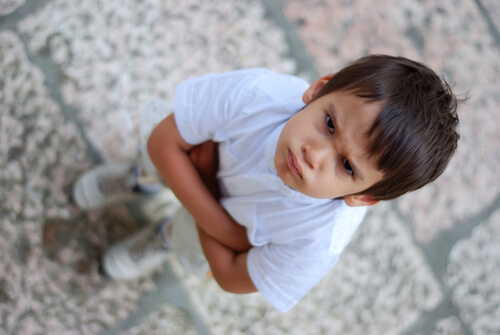Difficult Children and How to Deal with Them

Dealing with difficult children can be a big challenge. Learn how to respond adequately in order to help them grow in the best possible way.
The first thing one has to realize when dealing with difficult children is that part of their behavior is a reflection of our own temperament.
Many of children’s behaviors are reflections of what they’ve seen or learned at home.
However, there are other factors that interfere with the personality development of a child that challenges authority figures.
The best thing to do in those situations is to avoid impulsive reactions when you interact with them.
As an adult, it’s important for you to learn how to control your own emotions and avoid enacting the behaviors you deem inappropriate.
Follow these recommendations to improve your relationship with your children.
“Usually, behind these behavioral problems lies a parenting style that is too permissive. Parents that have a hard time following through with rules, that struggle when dealing with children’s difficulties and challenges, or that often give in to the children’s demands so as to be left alone”
-Úrsula Perona –
What to do when you have difficult children?
Pick your battles wisely
When a child is adapting to society, they’ll come to realize many actions are deemed unacceptable.
If each one of them causes a family discussion or a conflict, words will start to lose their meaning.
The behaviors you should prioritize are those that are dangerous or offensive. Those are the ones you should try to tackle.
For those actions that are less “severe”, choose strategies like time-outs.
Remember that in order to be consistent in disciplining children, there need to be consequences for inappropriate behaviors.

Take a deep breath and keep calm
If the difficult behavior is inevitable, try to regulate your own response. Use a calm but serious tone of voice and avoid words that are hurtful or discouraging.
In daily life at home, use suggestions and positive expressions. A calm and loving family environment can get you much further than discussions and aggressive confrontations.
Remember to also show that what you disagree on is the action and not the person.
The child needs to understand that your love for him/her is permanent and that you are only looking to help.
Manage situations with empathy
The best way to explain to children that they shouldn’t be aggressive is to make them see the situation from a different position or perspective.
Teach them to think of the consequences and the negative emotions their behavior can cause in others.
If this is done from very early on, children will grow up to be much more sensitive to those around them.
“Acceptance is something you need to take into account when dealing with difficult children”
Give them options
There are many ways you can achieve the desired behavior in your children without causing arguments.
Rather than ordering them to clean their room, make them believe they have options to choose from.
Divide the house work in smaller activities and let them choose which ones they would like to perform.
When a human being feels important and knows they have the power to decide, they’ll behave in a responsible way.
Give them options that are acceptable to you and that you know will lead to the desired outcome.
Thinking of solutions to manage emotions
It’s very normal that certain situations cause emotional alterations.
The real lesson to be learned is making children understand there are different healthy ways to express those emotions and stay away from the negative ones.
Practice breathing techniques, invite them on a walk and, above all, teach them not to hurt someone else’s feelings in a moment of anger.
After having communicated and managed the emotion, help them in finding solutions.
What could you do about the situation that caused you to feel angry? Children of all ages need to learn how to solve their little or bigger problems.

Admit your mistakes
Part of your job as a parent is accepting your own mistakes as a lesson learned.
You have to set the example. Sometimes we make mistakes and say things we don’t mean or get caught up in the heat of the moment.
When this happens, don’t hesitate to bravely admit that you’ve made a mistake. Adults too can mess up from time to time.
Acceptance is another factor that you should take into account when dealing with difficult children.
Even though the main aim is to correct their behavior and avoid future suffering, we should also make an effort to understand their personalities.
All cited sources were thoroughly reviewed by our team to ensure their quality, reliability, currency, and validity. The bibliography of this article was considered reliable and of academic or scientific accuracy.
- Angulo Rincón, R., i Ballabriga, J., del Claustre, M., Bonillo Martín, A., Viñas i Poch, F., Corcoll Champredonde, A., … & Carbonés, J. (2010). Evaluación de la sintomatología negativista desafiante en niños de 6 a 8 años: concordancia entre padres y maestros. © Psicothema, 2011, vol. 22, núm. 3, p. 455-459. http://aprendeenlinea.udea.edu.co/revistas/index.php/iatreia/article/view/4435
- Barkley, R., & Robin, A. (2011). Adolescentes desafiantes y rebeldes. Madrid: Paidós.
- Céspedes, A. (2007). Niños con pataleta, adolescentes desafiantes. Como manejar los trastornos de conducta en los hijos. Ed Vergara, Chile. http://www.colegioshaddai.cl/wp/wp-content/uploads/2015/08/Niños-con-pataletas.-Adolescentes-desafiantes-Amanda-Cespedes.pdf
- Vásquez, J., Feria, M., Palacios, L., & De la Peña, F. (2010). Guía clínica para el trastorno negativista desafiante. México: Instituto Nacional de Psiquiatría Ramón de la Fente Muñiz.(Serie: Guías clínicas para la atención en trastornos mentales). http://www.inprf-cd.gob.mx/guiasclinicas/trastorno_negativista.pdf
